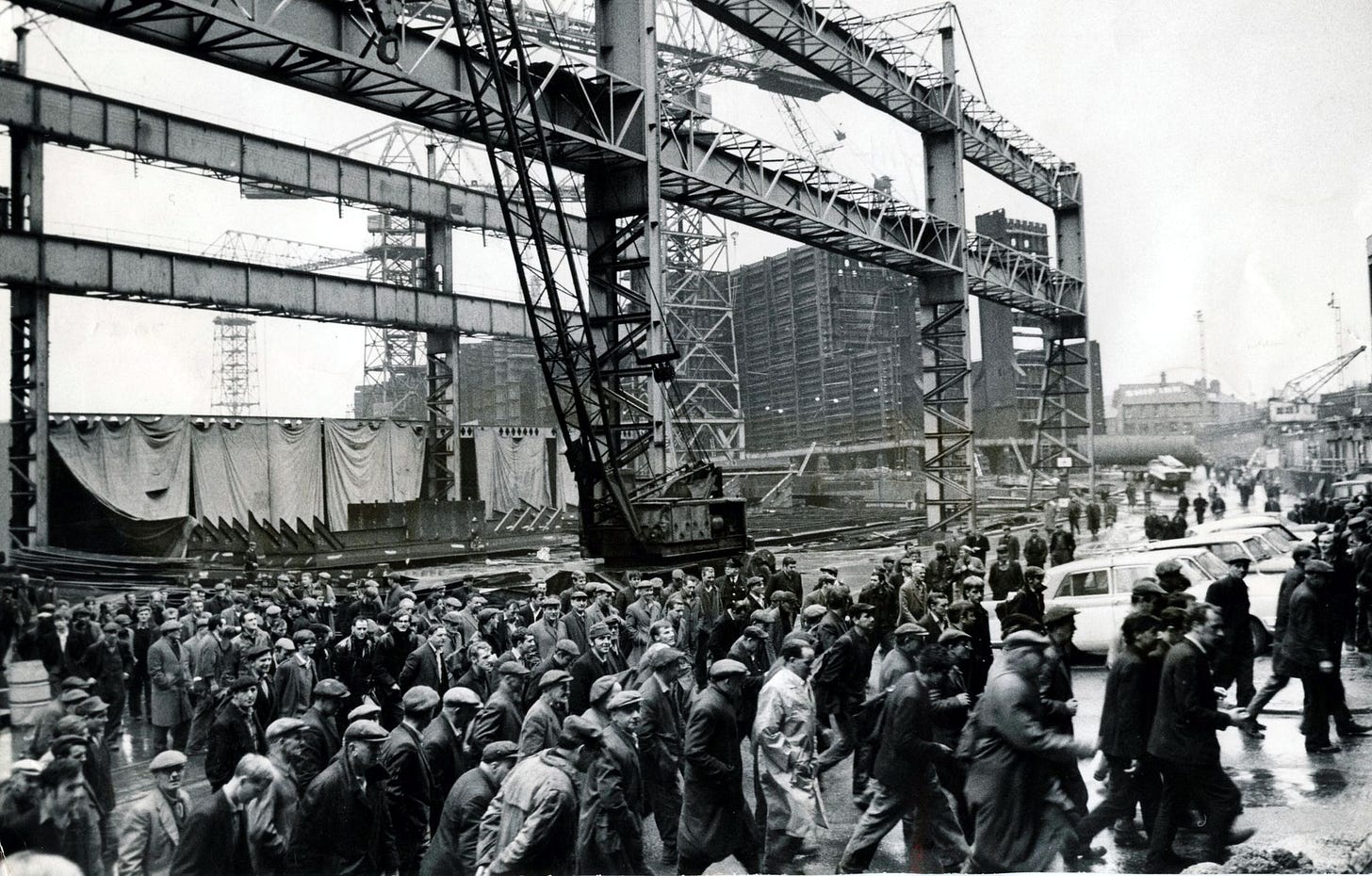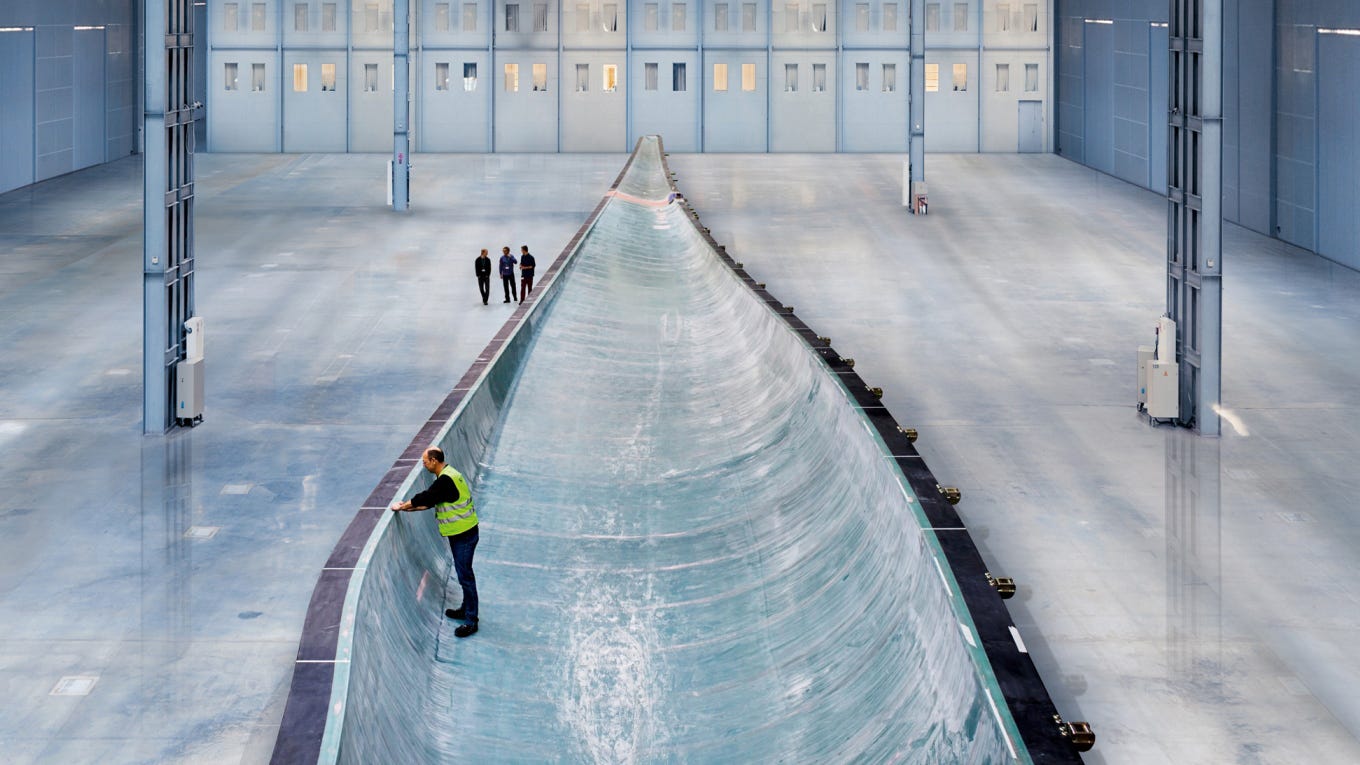Britain Can't Make It: Why We Mourn Manufacturing
The perception that we no longer make things is rooted in deeper anxieties
It’s the last thing Britain wanted to see: a wide empty plain, patched together from sections of tarmac, snow and dirt. This is the site in Blyth, Northumberland, where Britishvolt was supposed to build its factory for electric car batteries. But the company collapsed in January, still without a working product or customers, when its investment dried up.
Why is Britain so rubbish at manufacturing? Why don’t we make things anymore? These questions have been part of the public conversation throughout my adult life, in press and pubs alike. There never seems to be a shortage of news stories to justify them, though recent months have been especially grim. Aside from the Britishvolt fiasco, there have been reports of plunging factory output, another round of bailouts for our beleaguered steel industry, and now the news that UK car production is at its lowest point in more than sixty years. As if that weren’t enough, the new CEO of Rolls Royce, beacon of British engineering pride, has warned the company is “a burning platform.”
The obvious next step is for the government to come out with a new slogan. In little more than a decade, the promise of manufacturing renaissance has been central to George Osborne’s “march of the makers,” Johnson’s “green industrial revolution,” and, of course, “levelling up.”
But as the vague ring of these phrases suggests, anxieties over the decline of manufacturing are more about mood than detail. They express a deeper discomfort with the realities of globalised Britain: the once-prosperous industrial towns thrown on the scrapheap, the dependence on global markets for everything from face-masks to business investment, the service sector jobs that don’t seem to produce anything of tangible value.
This is not to deny that manufacturing has declined, at least in some very important ways. In 1981 the sector employed 5.7 million people, compared with 2.7 million in 2019. Over the same period, its share of UK economic output fell from thirty percent to ten. Entire industries like steel and shipbuilding have shrunk into insignificance. And manufacturing has consistently suffered from governments prioritising other parts of the economy, whether through high interest rates and a strong currency, or the ideological preference for glamorous “creative industries” in the New Labour years.
It is also true that, as the Britishvolt fiasco demonstrates, the UK is in danger of being left behind in an era of state-subsidised green manufacturing. There is a race on for the technologies and firms which will underpin the global drive to reduce carbon emissions. These green industries – from low-carbon steel and cement to electric vehicles, solar panels, wind turbines and hydrogen – have become a major front in the US-China rivalry, as both countries offer huge incentives for companies to develop the tech within their borders. The European Union is now gearing up to join the contest too, all of which suggests the UK will not land a big share of the jobs and revenue created by this shift.
Still, British manufacturing is not as flat on its face as the typical narrative would have you believe. How many of us know that, in terms of economic value, the three highest peaks of manufacturing output came in 2000, 2007 and 2018? Would you guess that Britain is still the ninth biggest manufacturer in the world? Of the UK’s twelve regions, only Northern Ireland has fewer than 100,000 people employed in the sector. And we make some cutting-edge stuff, from robotics to fighter jets.
The problem is that little of this satisfies our cherished image of manufacturing. The single biggest slice of Britain’s manufacturing pie is, in fact, food. As for more durable goods, production is now defined by specialisation and integration. Companies either make something very specific and obscure – camera lenses or laboratory equipment for instance – or they are part of much bigger transnational operations, which incorporate a multitude of producers with complex supply chains. As Richard Gardham writes about the BMW Mini, “The car is ‘made’ in Oxford, but any single part – its crankshaft, for example – can cross the English Channel multiple times during production, as different elements are added by specialist companies.”
We all know that globalisation killed our manufacturing, but what we mean is it killed a particular model of manufacturing. There are no longer many factories where all the men from the local town go each morning to build things from scratch and ship them out. At the risk of indulging in lazy tropes about British nostalgia, there is undoubtedly something comforting in that traditional image of industry, with the solid, cohesive social structure it implies. Yet few companies working like this could be remotely competitive today.
This is an unsettling situation, not least because it means there is no recognisable class of makers to match the things among which we live. Historically most products could be identified with a human world from which they originated, whether it be the world of artisans or, after the industrial revolution, the working class. Our experience today is much more uncanny: a deluge of goods simply appears on Amazon, in advertising, in chain stores and showrooms. Beyond the ubiquitous Made In China stamp, we have little sense of where it all comes from.
The economists would point out our comparative advantage in other areas pays for these imports, but this seems like a case where theory and moral intuitions fail to align. How can it be anything other than a sign of terminal decadence that we consume so much more than we make? And we should give intuition its due: relying on global markets can be a risky business, as the medical shortages and supply chain disruptions of recent years have shown.

What makes all of this especially poignant in Britain is the bitter legacy of deindustrialisation. It was through the crushing of organised labour in the 1980s, and the subsequent offshoring of major industries, that manufacturing lost its presence in national life. Whatever you make of the economic and political rationale for this transformation, it is increasingly judged by its most brutal consequences: a hinterland of “left behind” places that successive governments consigned to the dustbin of history, only for them to return as a stain on the national conscience. Manufacturing has an emotional charge today in part because it has become a shorthand for these traumatic events.
Deindustrialisation may be haunting Britain in a more concrete sense too. As nations compete for a stake in the next generation of manufacturing, an issue that crops up time and again is shortage of institutional expertise. Whether it be semiconductors or ventilators, it turns out that tax incentives and speeches about industrial policy aren’t enough to make complex hardware appear. More important is an “industrial commons” of existing companies with experience and skills built up over generations. It’s notable that Britishvolt, the UK’s recent battery-making failure, was founded by businessmen with no relevant engineering background.
Now consider the two big European firms that make the Britain’s wind turbines: Denmark’s Vestas and Germany’s Siemens have been in operation since 1945 and 1847 respectively. There are plenty of younger companies involved in green manufacturing, but they need to draw on a wider industrial culture too. Building that culture will take time and money, neither of which the UK is particularly blessed with at the moment.



